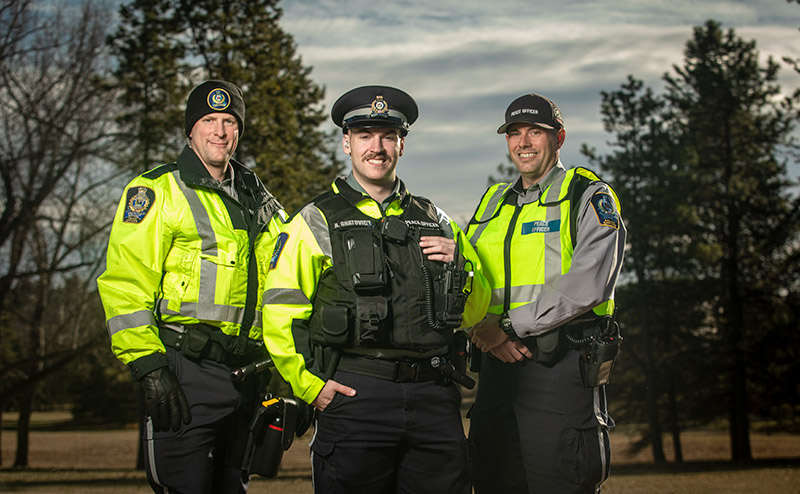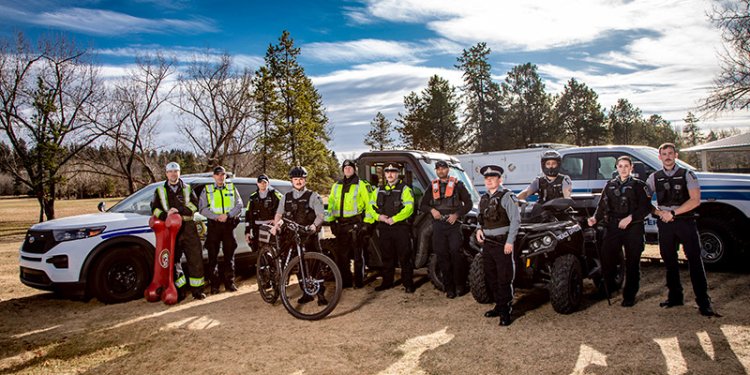
Peace Officers employed by the City perform various duties, including securing City buildings and infrastructure, assisting residents and customers, and enforcing both municipal and provincial laws.
Depending on their area of focus, they can be found downtown, on transit, in parks, on the North Saskatchewan River, on city highways and in neighbourhoods.
Peace Officer Units include:
- Park Rangers
- Animal Control
- Encampment Response Teams
- Vehicle for Hire
- Commercial Vehicle Inspectors
- Community Peace Officers
- Transit Peace Officers
They can be identified by their uniform, which can vary based on the role and season.
Law enforcement officers often carry tools that are intended to protect the public and themselves from individuals who present a threat and who can be armed.
Although the primary response to complaint calls of armed individuals in Edmonton falls to the Edmonton Police Service, due to the nature of their work, City peace officers are also exposed to weapons and armed people during their shifts.
Peace officers carry the following:
- First-aid supplies
- Narcan
- Baton
- MK3 (small Oleoresin Capsicum (OC) spray)
- Handcuffs
- Portable radio
- Work cell phone
- Mk9 (large OC spray on a leg holster)
MK3 (Small Oleoresin Capsicum (OC) Spray)
A standard piece of their current kit includes a belt-mounted MK-3 aerosol OC spray stream projector. The current MK3 OC spray used is limited by dose and effective range, which reduces the canister size and weight that officers have to carry.
Given a rise in the severity of incidents and the increasing frequency of weapons being involved in those incidents, the City has begun exploring additional tools, such as the MK9 OC spray, to assist in officer and public safety.
Our Approach to Enforcement: The 4Es
The City of Edmonton’s enforcement philosophy follows an escalating process known as the “4Es”: Engage, Educate, Encourage and Enforce.
Start with a conversation to build trust and provide guidance. Officers engage with the public to clarify expectations and promote voluntary compliance.
Share information and resources to help the public understand their responsibilities and the reasons behind regulations. Education is key to fostering long-term behavioural change.
Use positive reinforcement and informal solutions to motivate compliance. Encouragement helps resolve issues collaboratively without immediate punitive action.
When necessary, take formal action through penalties or legal measures. Enforcement is used only when engagement, education and encouragement fail.
Accountability and Transparency
City Peace Officers are held to the highest standards of accountability and are governed by multiple layers of oversight. This includes provincial legislation, stringent guidelines, mandatory reporting to the Peace Officer program, and adherence to the City’s Code of Conduct, policies and internal processes.
The City publicly reports on use-of-force events and Peace Officer complaints every 6 months to be transparent to Edmontonians. Updated reports are usually made available in February and August.
Peace Officers prioritize gaining compliance through conversations, public education, informal resolutions, and warnings. When these measures prove insufficient, enforcement becomes necessary. When necessary, they issue fines for violating city bylaws or provincial Acts.
Officers use discretion based on the specific situation and are guided by a holistic mindset, looking for the best approach to gain compliance. When appropriate, they can refer individuals to social support agencies as an alternative to enforcement.
Professional Standards Unit
A Professional Standards Investigator manages non-criminal complaints and commendations from the public concerning Peace Officers. Professionalism, accountability, and transparency are critical elements in the success of the service we provide to our customers.
All compliments and concerns processed are administered in an open, fair, accountable, and professional manner and are regulated by the:
Peace Officer Act
Peace Officer Regulation
Peace Officer Act (Ministerial) Regulation
Peace Officer Program Policy
Reporting Process
If residents have a compliment or concern about a Community Standards Peace Officer interaction or conduct, they can share their feedback in 4 ways.
- Call 311
- Email peaceofficerconcerns@edmonton.ca
- Mail the Public Complaint Form to:
Professional Standards
3rd Floor Century Place
9803 102 A Ave
Edmonton, AB, T5J3A3
Professional Standards usually responds within 1-3 business days to advise that the complaint has been received. Edmontonians’ concerns and informal complaints take approximately 1-2 weeks to investigate, while more serious allegations vary in timelines depending on the complexity of the file.
Frequently Asked Questions
The City of Edmonton employs approximately 240 full-time equivalent Peace Officers in the Community Standards and Neighbourhoods Branch who serve Edmontonians as Community Standards Peace Officers, Transit Peace Officers, Animal Control Peace Officers and Park Ranger Peace Officers.
Peace Officers are designated through the Alberta Ministry of Public Safety and Emergency Services (PSES) and are authorized to enforce both City bylaws and provincial acts.



